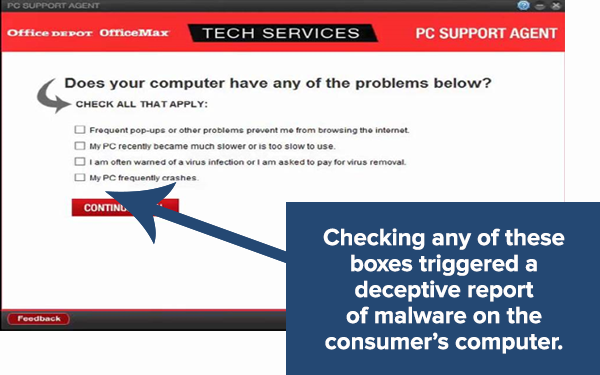Office Depot, Inc. and a California-based tech support software provider have agreed to pay a total of $35 million to settle Federal Trade Commission allegations that the companies tricked customers into buying millions of dollars’ worth of computer repair and technical services by deceptively claiming their software had found malware symptoms on the customers’ computers.
Office Depot has agreed to pay $25 million while its software supplier, Support.com, Inc., has agreed to pay $10 million as part of their settlements with the FTC. The FTC intends to use these funds to provide refunds to consumers.
“Consumers have a hard enough time protecting their computers from malware, viruses, and other threats,” said FTC Chairman Joe Simons. “This case should send a strong message to companies that they will face stiff consequences if they use deception to trick consumers into buying costly services they may not need.”
 In its complaint, the FTC alleges that Support.com worked with Office Depot for nearly a decade to sell technical support services at its stores. Office Depot and Support.com used PC Health Check, a software program, as a sales tool to convince consumers to purchase tech repair services from Office Depot and OfficeMax, Inc., which merged in 2013.
In its complaint, the FTC alleges that Support.com worked with Office Depot for nearly a decade to sell technical support services at its stores. Office Depot and Support.com used PC Health Check, a software program, as a sales tool to convince consumers to purchase tech repair services from Office Depot and OfficeMax, Inc., which merged in 2013.
The Office Depot companies marketed the program as a free “PC check-up” or tune-up service to help improve a computer’s performance and scan for viruses and other security threats. Support.com, which received tens of millions of dollars in revenue from Office Depot, remotely performed the tech repair services once consumers made the purchase.
The FTC alleges that while Office Depot claimed the program detected malware symptoms on consumers’ computers, the actual results presented to consumers were based entirely on whether consumers answered “yes” to four questions they were asked at the beginning of the PC Health Check program. These included questions about whether the computer ran slow, received virus warnings, crashed often, or displayed pop-up ads or other problems that prevented the user from browsing the Internet.
The complaint alleges that Office Depot and Support.com configured the PC Health Check Program to report that the scan found malware symptoms or infections whenever consumers answered yes to at least one of these four questions, despite the fact that the scan had no connection to the “malware symptoms” results. After displaying the results of the scan, the program also displayed a “view recommendation” button with a detailed description of the tech services consumers were encouraged to purchase—services that could cost hundreds of dollars—to fix the problems.
The FTC alleges that both Office Depot and Support.com have been aware of concerns and complaints about the PC Health Check program since at least 2012. For example, one OfficeMax employee complained to corporate management in 2012, saying “I cannot justify lying to a customer or being TRICKED into lying to them for our store to make a few extra dollars.” Despite this and other internal warnings, Office Depot continued until late 2016 to advertise and use the PC Health Check program and pushed its store managers and employees to generate sales from the program, according to the complaint.
The Commission alleges that both companies violated the FTC Act’s prohibition against deceptive practices.
In addition to the monetary payment, the proposed settlement also prohibits Office Depot from making misrepresentations about the security or performance of a consumer’s electronic device and requires the company to ensure its existing and future software providers do not engage in such conduct. As part of its proposed settlement, Support.com cannot make, or provide others with the means to make, misrepresentations about the performance or detection of security issues on consumer electronic devices.
The Commission vote authorizing the staff to file the complaint and stipulated final orders was 5-0. The FTC filed the complaint and stipulated final orders in the U.S. District Court for the Southern District of Florida. NOTE: The Commission files a complaint when it has “reason to believe” that the law has been or is being violated and it appears to the Commission that a proceeding is in the public interest. Stipulated final orders have the force of law when approved and signed by a District Court judge.
The Federal Trade Commission works to promote competition, and protect and educate consumers. You can learn more about consumer topics and file a consumer complaint online or by calling 1-877-FTC-HELP (382-4357). Like the FTC on Facebook, follow us on Twitter, read our blogs, and subscribe to press releases for the latest FTC news and resources.
